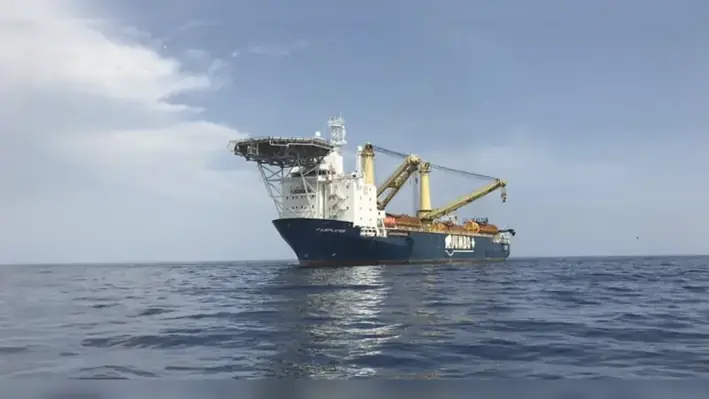
 Jumbo Offshore has completed mooring pre-installation activities for the FPSO Errea Wittu at Uaru field, Stabroek block, offshore Guyana for Exxon Mobil Guyana
Jumbo Offshore has completed mooring pre-installation activities for the FPSO Errea Wittu at Uaru field, Stabroek block, offshore Guyana for Exxon Mobil Guyana
The scope of work, conducted on behalf of Modec, included the installation of suction anchors and the pre-lay of mooring lines in preparation for FPSO hook-up.
Jumbo Offshore performed installation engineering, procurement, mobilisation and marshalling activities to support offshore installation, using Jumbo Offshore’s J-class installation vessel, Fairplayer.
“I am very proud of the hard work and commitment shown by all Jumbo personnel and subcontractors during the preparation, mobilisation, and execution of this deepwater pre-lay mooring project,” said Freek Muurling, Project Manager at Jumbo Offshore. “The team demonstrated full focus on engineering, procurement, documentation, and meticulous planning in sometimes challenging circumstances. The yard and offshore teams’ resilience and teamwork led to a safe and successful completion of the mooring line installation campaign."
Muurling also highlighted the effective communications between Jumbo, Modec, and Exxon, which created a strong working relationship and contributed greatly to moving the project forward safely and efficiently.
The Uaru field is located 200 kilometres offshore Guyana at a depth of 1,750 metres and is estimated to hold more than 800 million barrels of oil. Production is expected to begin this year.
The Errea Wittu FPSO will produce 250,000 barrels of oil per day and will have a gas treatment capacity of 540 million cubic feet per day. It will have a water injection capacity of 350,000bpd, a produced water capacity of 300,000bpd and a storage capacity of two million barrels of crude oil.
Guyana is seeing its offshore sector expand rapidly, which in turn is spurring significant economic growth in the country. According to Finance Minister Ashni Singh Singh, whose remarks when presenting the nationa's annual budget were reported by Reuters, the oil sector is set to grow 17.9% this year. He forecast 309 crude oil cargo exports, up from 260 last year, and estimated oil revenue of about US$2.79bn.
ExxonMobil Guyana Limited and its Stabroek block co-partners, Hess Guyana Exploration Limited, and CNOOC Petroleum Guyana Limited are progressing several offshore developments in Guyana’s offshore Stabroek Block. The consortium reached a new production milestone of 900,000 bopd in November 2025, following the ramp-up of Yellowtail, Guyana’s fourth offshore project, and excellent operating performance from other assets. Once its other four planned developments are in production, ExxonMobil Guyana expects to have total production capacity of 1.7mn bopd.
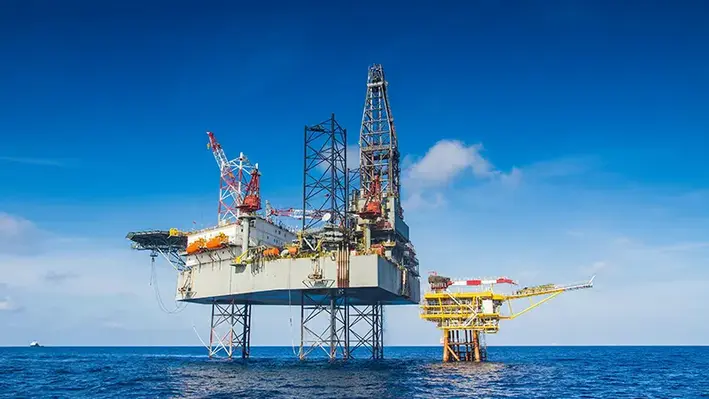
 The Government of Guyana is progressing with plans to enhance governance and institutional capacity in the country’s growing oil and gas industry, according to Senior Minister in the Office of the President with Responsibility for Finance, Dr Ashni Singh.
The Government of Guyana is progressing with plans to enhance governance and institutional capacity in the country’s growing oil and gas industry, according to Senior Minister in the Office of the President with Responsibility for Finance, Dr Ashni Singh.
During the Budget 2026 presentation, Dr Singh stated that the administration is working to create a modern and credible governance system for the oil and gas sector, which involves updating laws and regulations, strengthening key institutions, and continuously developing technical skills within the public sector.
In the past five years, the government has launched a wide-ranging legislative reform effort to align the petroleum sector with international standards. This includes enacting the Natural Resource Fund (NRF) Act and the Local Content Act (LCA) in 2021, the Petroleum Activities Act (PAA) in 2023 – which replaced the 1986 Petroleum Act – and the Oil Pollution Prevention, Preparedness, Response and Responsibility Act (OPPPRRA) in 2025 to address environmental risks and emergency protocols.
Dr Singh added that the government plans to update the First Schedule of the Local Content Act this year to expand the range of goods and services eligible under local content rules. The review of regulations under the Petroleum Activities Act is progressing, incorporating lessons from the Hammerhead Petroleum Production Licensing process, with finalisation and implementation of the regulations expected this year. Also expected this year are the implementation and rollout of coordinated compliance and enforcement measures.
Dr Singh emphasised the administration’s commitment to developing human capital within the petroleum governance framework, highlighting the importance of strengthening local skills for managing the petroleum economy effectively. In 2025, government agencies took part in targeted training sessions led by industry experts in areas such as market analytics, cost estimation, and scenario modelling, with further such sessions planned.
Guyana is seeing its offshore sector expand rapidly, which in turn is spurring significant economic growth in the country and creating much-needed jobs. ExxonMobil Guyana Limited and its Stabroek block co-venturers, Hess Guyana Exploration Limited, and CNOOC Petroleum Guyana Limited are progressing several offshore developments in Guyana’s offshore Stabroek Block. The consortium reached a new production milestone of 900,000 bopd in November 2025, following the ramp-up of Yellotail, Guyana’s fourth offshore project, and excellent operating performance from other assets. The Uaru and Whiptail projects, Guyana’s fifth and sixth projects, due to begin operations in 2026 and 2027 respectively, are each expected to produce approximately 250,000 bopd. Hammerhead, the seventh project, is expected to add approximately 150,000 bopd when production begins in 2029. An eighth project, Longtail, is currently undergoing regulatory reviews. Once approved, ExxonMobil Guyana expects to have total production capacity of 1.7mn bopd from the eight developments.
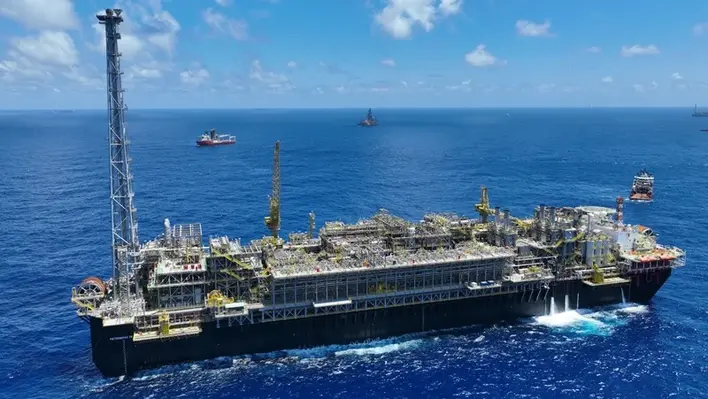
 Petrobras has begun oil production from the P-78 floating production, storage and offloading (FPSO) vessel in the Búzios field, in the pre-salt layer of the Santos Basin.
Petrobras has begun oil production from the P-78 floating production, storage and offloading (FPSO) vessel in the Búzios field, in the pre-salt layer of the Santos Basin.
Búzios 6 (P-78) has the capacity to produce 180,000 barrels of oil and 7.2 million cubic metres of gas per day. The FPSO will increase the field's installed production capacity to approximately 1.15 million barrels of oil per day. The project will also allow for the export of gas to the mainland via interconnection with the ROTA 3 gas pipeline , expanding Brazil's gas supply by up to 3mn cubic metres per day .
"With the first oil from the P-78 platform, we are starting the year already advancing towards our main goal for 2026: increasing Petrobras' oil and gas production. We project producing 2.5 million barrels of oil per day throughout this year, and a large part of that will come from Búzios, the country's largest field in terms of reserves and production. In addition, we are also expanding the supply of natural gas to the Brazilian market, another goal expressed in our Business Plan," said Magda Chambriard, president of Petrobras.
The P-78 is an FPSO (Floating Production, Storage and Offloading) unit and inaugurates a new family of proprietary unit projects, bringing even greater safety and reliability to operations. The platform is equipped with technologies for reducing emissions and increasing operational efficiency, notably the exhaust gas recovery system, the adoption of variable speed drives in pumps and compressors, and energy integrations between hot and cold streams in oil and gas processing.
The project comprises 13 wells, 6 producers and 7 injectors, equipped with intelligent completion systems that enhance production management. The unit will be interconnected with rigid pipelines for production, injection and gas export, and flexible pipelines for service lines, using innovative technologies for attaching the pipelines to the FPSO. These pipelines will allow for the high-capacity production planned for the field's wells.
The platform is the seventh in operation in the Búzios field, the largest in the country in terms of reserves. Located 180 km off the coast of the state of Rio de Janeiro, in ultra-deep waters of the Santos Basin, at a depth of more than 2,000 meters, it surpassed 1mn bpd production in October 2025.

 BW Energy has announced that the short-term lease for the Super Gorilla class jack-up rig BW MAROMBA B, to be deployed in Brazil's Maromba field, has been successfully converted into a long-term project lease agreement with Minsheng Financial Leasing Co. Ltd. (MSFL)
BW Energy has announced that the short-term lease for the Super Gorilla class jack-up rig BW MAROMBA B, to be deployed in Brazil's Maromba field, has been successfully converted into a long-term project lease agreement with Minsheng Financial Leasing Co. Ltd. (MSFL)
The new lease agreement covers the rig purchase and all costs required to get the MAROMBA B wellhead platform ready for drilling and production. This provides an efficient lease financing structure for the project's development phase, followed by a 10-year lease term. The lease will commence upon first oil for the Maromba development, with no payments due before this point. The lease carries a fixed daily rate of US$ 120,500, providing cost predictability throughout the lease period.
"We are pleased to establish an attractive lease financing for the full scope of the Maromba wellhead platform investment, building on our strong relationship with MSFL," said Thomas Young, the CFO of BW Energy. "This agreement further highlights our ability to consistently leverage repurposed production infrastructure to enable cost-efficient greenfield developments."
The rig is expected to arrive in Dubai from Singapore before the end of the year. At the yard in Dubai, it will be refurbished and converted into a fully integrated drilling and production platform. The unit's recent drilling service in Australia supports an efficient upgrade and refurbishment programme. When completed, it will mobilise to Brazil and commence drilling and completion work according to the phased development plan for the Maromba field.
The Maromba field in the southern Campos Basin offshore Brazil, around 100 km southeast of the city of Cabo Frio, is estimated to contain around 100mn bbl of oil and has an estimated oil production capacity of 30,000 to 40,000 barrels per day. It is 95% owned by BW Energy, the operator, and is being developed in phases, with first oil scheduled for 2027. 5 Star Oil & Gas Brasil Ltda holds a 5% back-in right in the Maromba licence.
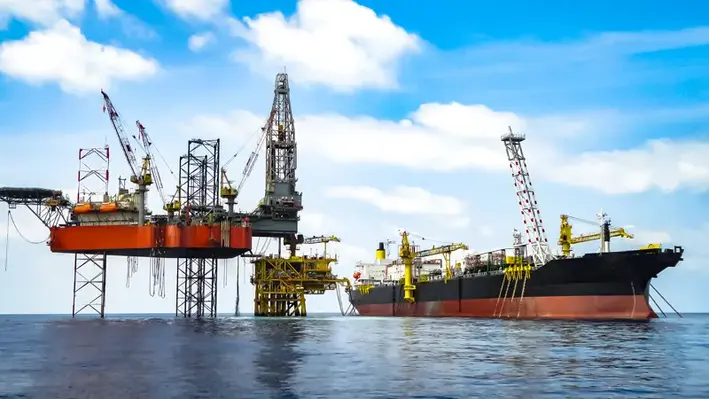
 Petrobras and Shell Brasil Petróleo Ltda. (Shell Brasil), a subsidiary of Shell plc, have together secured additional equity in Brazil’s pre-salt oil projects following an auction led by Pré-Sal Petróleo.
Petrobras and Shell Brasil Petróleo Ltda. (Shell Brasil), a subsidiary of Shell plc, have together secured additional equity in Brazil’s pre-salt oil projects following an auction led by Pré-Sal Petróleo.
Petrobras increased its stake in the shared Mero field from 38.6% to 41.4%, and increased its stake in the shared Atapu field from 65.687% to 66.38%. Shell Brasil increased its participating interest from 16.663% to 16.917% in Atapu and from 19.3% to 20% in Mero.
Both projects are located in the offshore Santos Basin. In the Mero field, the four FPSOs and an Early Production System (EPS) have a combined gross installed production capacity of 770,000 barrels of oil per day. the P-70 Floating, Production, Storage and Offloading unit (FPSO), which has the capacity to produce 150,000 barrels of oil per day. To support future growth, a second FPSO (P-84), with a production capacity of 225,000 barrels of oil per day, is currently under construction.
This auction was supported by Law No. 15,164, of July 14, 2025, which amended Law No. 12,351, of December 22, 2010, authorising the Union to sell its rights and obligations arising from production individualisation agreements in non-granted or non-shared areas in the pre-salt area.
Petrobras' participation in the PPSA Uncontracted Areas Auction is aligned with the company's long-term strategy, reaffirmed in the 2026-30 Business Plan, which foresees the replenishment of its oil and gas reserves with economic and environmental resilience.
In Shell’s case, the investment strengthens Shell’s position in areas where it has existing assets and supports the company’s aim to sustain material liquids production of 1.4 million barrels per day through 2030.
“Today’s winning bid reinforces our disciplined approach to grow Shell’s high margin portfolio in Brazil,” said Peter Costello, Shell’s Upstream President. “Our assets in Brazil are among the most competitive in our global portfolio, combining strong performance with a low carbon footprint.”

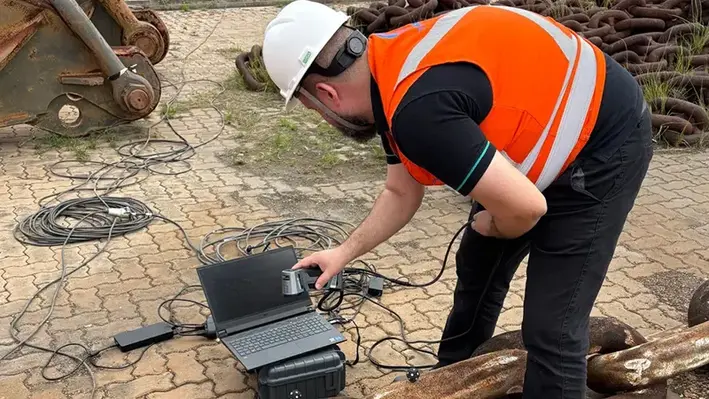 Acteon’s Moorings and Anchors business line, Intermoor, has been awarded a broad-ranging quality assurance contract by Petrobras in Brazil.
Acteon’s Moorings and Anchors business line, Intermoor, has been awarded a broad-ranging quality assurance contract by Petrobras in Brazil.
The three-year contract is the result of a Memorandum of Understanding (MoU) that was signed at the Offshore Technology Conference (OTC) in Houston in May.
As work is set to commence this month, Intermoor will be providing traceability services across Petrobras’ extensive inventory of critical mooring components, besides delivering comprehensive quality assurance as well. The mooring component comprises an intricate network of anchors, chains, wire and associated accessories that supports Petrobras offshore operations portfolio across Brazil.
Other services will include Radio Frequency Identification (RFID) tag installation, dimensional and visual inspection of mooring equipment, triage of returned components and deployment of advanced 3D scanning and photogrammetry technologies. While these will cover Petrobras’ bases in Rio de Janeiro and Macaé, it also has scopes for expansion to additional sites nationwide.
The contract further solidifies Acteon’s two-decade presence in Brazil, where the company operates five offices providing engineering, survey and mooring support services, including quayside facilities at Porto do Açu.
"This award is a strong endorsement of our long-standing partnership with Petrobras and our commitment to the safe, efficient management of critical offshore infrastructure. By combining proven mooring expertise with innovative digital monitoring and inspection technologies, we provide insight and rapid responsiveness our customers need to protect assets, optimise performance and make confident decisions across the entire project lifecycle," said David McGuire, EVP, InterMoor.
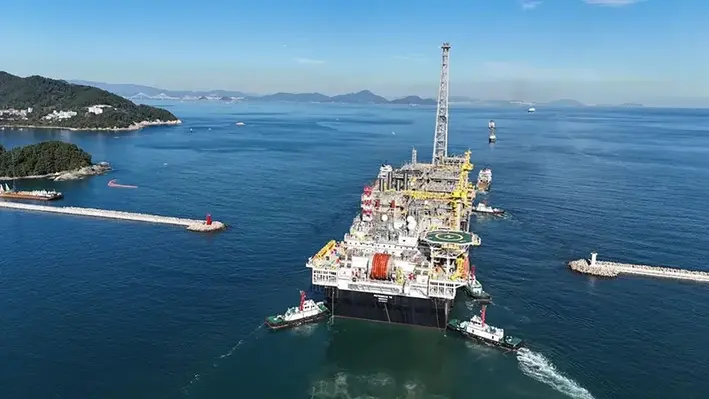
 Petrobras’s P-79 floating production, storage and offloading (FPSO) vessel has left the Hanwha Ocean shipyard in South Korea and is due to arrive at the Búzios field in the pre-salt layer of the Santos Basin in February 2026.
Petrobras’s P-79 floating production, storage and offloading (FPSO) vessel has left the Hanwha Ocean shipyard in South Korea and is due to arrive at the Búzios field in the pre-salt layer of the Santos Basin in February 2026.
The platform will be towed to its location with the crew on board, which will help speed up the start of production, according to the company.
“The arrival of the crewed platform, as was done with the P-78, has proven to be a successful strategy for reducing the time to start production,” said Renata Baruzzi, director of Engineering, Technology and Innovation at Petrobras.
“This is the eighth unit of the 12 planned for the field. Our expectation is that we will be able to anticipate the first oil by two months compared to what is planned in our Strategic Plan. This is yet another result of the dedication of the entire Petrobras team, combined with negotiations with suppliers, detailed planning and, above all, discipline to carry out what was planned,” he commented.
Production from the platform is scheduled to begin in August 2026 and will increase the current installed production capacity of the Búzios field by approximately 15.6% , to around 1.3mn bpd, taking into account the start of production of the P-78 in December of this year.
The Búzios field is located in ultra-deep waters of the Santos Basin (depth up to 2,100 meters), 180 km off the coast of the state of Rio de Janeiro, where six FPSOs are already producing: P-74, P-75, P-76, P-77, Almirante Barroso, and Almirante Tamandaré. In October, it became Petrobras' largest producing field, exceeding 1 million bpd. The P-79 project includes 14 wells, eight of which are producers and six are WAG injectors (alternating oil and gas injection technology).
The hull construction took place at Hanwha Ocean in Geoje-Si, South Korea, where the integration and commissioning of the topside modules, built in China, Brazil, South Korea, and Indonesia, also took place.
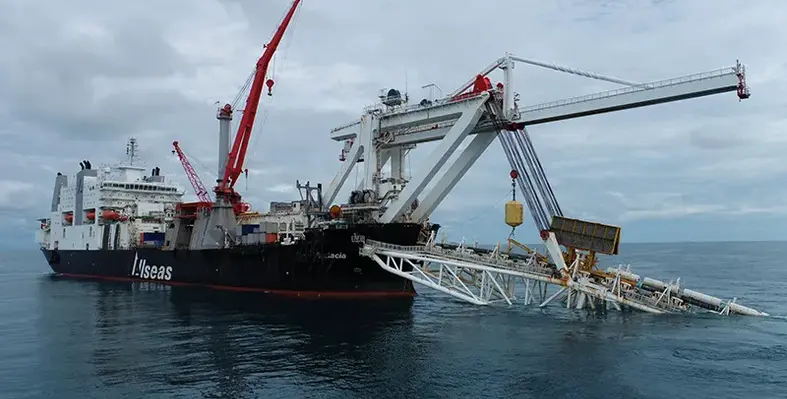
 Petrobras will be acquiring a rigid riser-based subsea solution by Allseas for the ultra-deepwater Ataptu-2 pre-salt field development, 230 kms offshore Rio de Janeiro, Brazil.
Petrobras will be acquiring a rigid riser-based subsea solution by Allseas for the ultra-deepwater Ataptu-2 pre-salt field development, 230 kms offshore Rio de Janeiro, Brazil.
Won by tender, the contract covers design, procurement, construction and installation of 143 kms of rigid risers and flowlines in water depths exceeding 2000 metres. The subsea network will connect 18 wells to a new FPSO via steel catenary risers in a ‘lazy wave’ configuration. The scope also includes critical components such as flex-joints, pipeline end terminations and jumpers to complete the connections. Offshore work is scheduled to begin in Q1 2029 and will be executed by Allseas’ pipelay vessel Audacia.
Scopewise, Atapu-2 surpasses Búzios-10, comprising additional wells and longer pipeline systems. The combined value of Búzios-10 and Atapu-2 contracts rank among the largest and most technically complex in Allseas’ 40-year history.
With offshore work scheduled to begin in Q1 2029, Allseas' project management and engineering presence has been expanded in Rio de Janeiro to support both projects aided by its strategic hub for operations in Brazil. Preparations are underway to award subcontracts for seamless linepipe manufacturing, internal cladding and flexible joints for the steel catenary risers, further strengthening the local supply chain.
André de Melo, Allseas General Manager Brazil, said, “This award demonstrates Petrobras’ confidence in Allseas’ proven capability to execute large-scale, technically complex projects safely and efficiently. We are proud to contribute to the continued development of Brazil’s offshore resources and to strengthen our engagement with local suppliers and talent.”
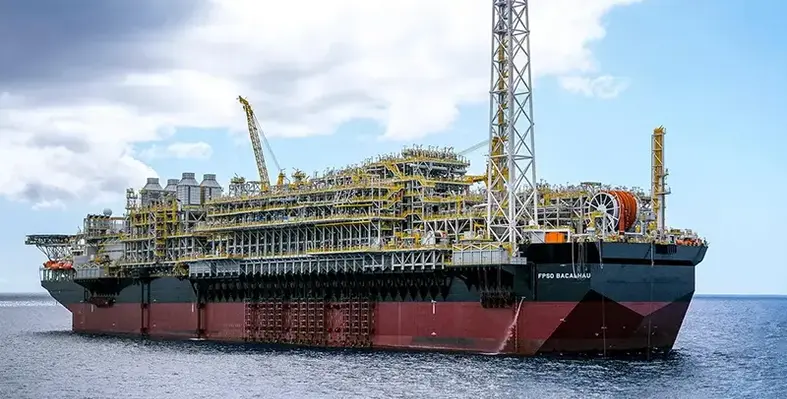
 The Bacalhau field in Brazil has seen start-up of production as its operator, Equinor, along with partners ExxonMobil Brasil, Petrogal Brasil (JV Galp|Sinopec) and Pré-sal Petróleo SA (PPSA), achieved exceptional engineering feat.
The Bacalhau field in Brazil has seen start-up of production as its operator, Equinor, along with partners ExxonMobil Brasil, Petrogal Brasil (JV Galp|Sinopec) and Pré-sal Petróleo SA (PPSA), achieved exceptional engineering feat.
“Around 70 million hours of work have been recorded in the project with solid safety results. I would like to sincerely thank our partners, suppliers, and employees for making this achievement a reality. With its size, water depth and lower carbon intensity, Bacalhau is a testament to our engineering capabilities and ability to operate internationally,” said Geir Tungesvik, Executive Vice President, Projects, Drilling and Procurement.
With recoverable reserves surpassing 1 billion barrels of oil equivalent (boe), Bacalhau is the largest international offshore field ever developed by Equinor.
"The safe start-up of Bacalhau marks a major milestone for Equinor. Bacalhau represents a new generation of projects that bring together scale, cost-efficiency and lower carbon intensity. With this development, we are strengthening the longevity of our oil and gas production and securing value creation for decades to come,” says Anders Opedal, President and CEO of Equinor.
Bacalhau is located in the pre-salt region of Brazil's Santos Basin in ultra-deep water exceeding 2,000 metres. The field features one of the most modern floating production storage and offloading vessels (FPSO) in the world, measuring 370 metres in length and 64 metres in width, with a production capacity of 220,000 barrels of oil per day (bpd).
About 19 wells, producers and injectors are set to be brought online in sequence as part of the Phase 1 development of the project ahead of ramp up and production sustenance work.
The Bacalhau FPSO is equipped with advanced carbon-reduction technology in the form of combined-cycle gas turbines (CCGT). With an expected CO₂ intensity of around 9 kg per boe, and advanced abatement across flaring, processing, power generation, and storage, the field sets a new benchmark for cost efficient and lower emission deepwater production.
“Brazil is a core area for us and Bacalhau will be a major contributorto Equinor’s goal of generating more than 5 billion dollars of free cashflow by 2030 from our international portfolio. Bacalhau will also deliver positive ripple effects and long-term benefits to Brazil´s economy, creating approximately 50,000 jobs over its 30-year lifetime,” said Philippe Mathieu, Executive Vice President for Exploration and Production International.
MODEC, the FPSO contractor, will operate the unit for the initial phase. Thereafter, Equinor plans to operate the Bacalhau facilities until end of the license period.
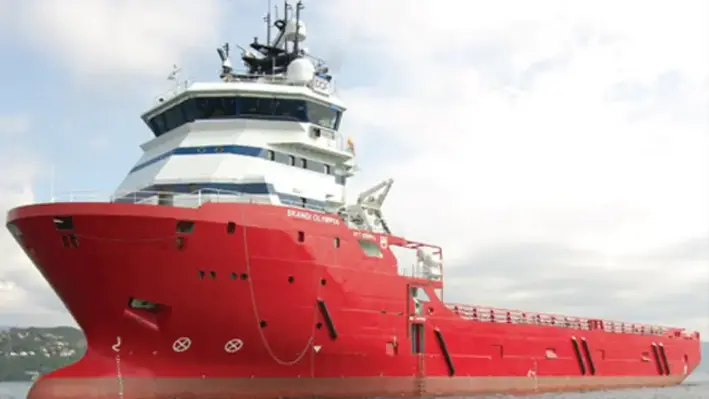
 DOF Group ASA has secured two new long-term contracts with Brazil’s state-owned energy company Petrobras.
DOF Group ASA has secured two new long-term contracts with Brazil’s state-owned energy company Petrobras.
Skandi Chieftain and Skandi Olympia have been awarded four-year charters with the operator, with both contracts offering a combined value of approximately US$200mn. Both vessels will operate with one WROV and are expected to be delivered in October 2026.
The contracts followed the same competitive tender process that resulted in the award of Skandi Achiever, Skandi Carla, Geoholm and Skandi Salvador on the RSV 2024 tender.
Last month the Group was also awarded three service contracts for work in Brazil under Petrobras for subsea inspections as part of the operator’s subsea programme.
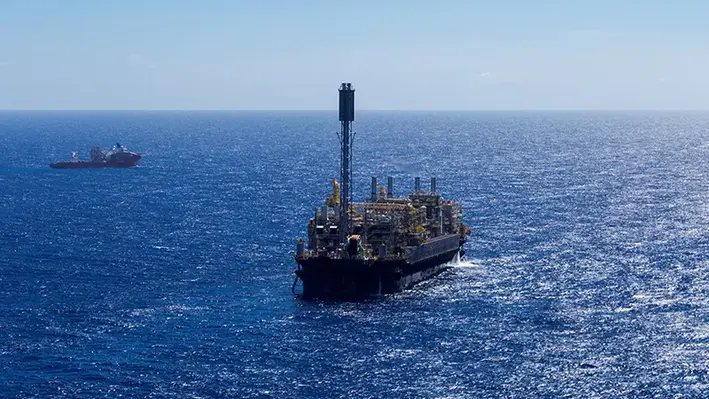
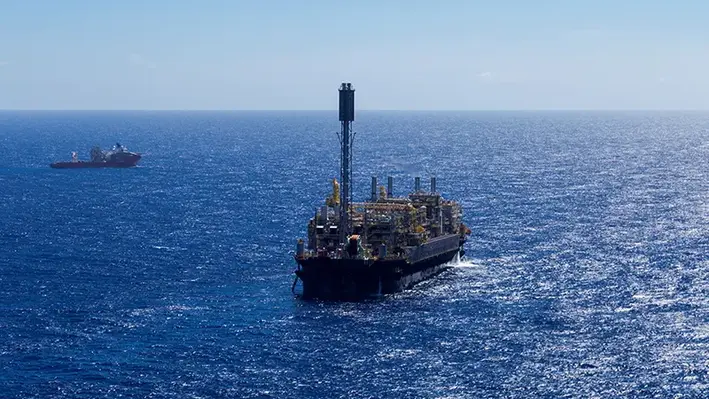 As part of consolidating its largest producing field, Petrobras has began contracting for the construction of the FPSO Buzios 12 for installation in the Santos Basin, in the state of Rio de Janeiro.
As part of consolidating its largest producing field, Petrobras has began contracting for the construction of the FPSO Buzios 12 for installation in the Santos Basin, in the state of Rio de Janeiro.
P-91, which will be the 12th platform assigned to the Buzios field, will be connected to 16 wells, including eight producers and eight alternating water and gas injectors, with a capacity to produce 180,000 barrels of oil per day and 12 million cubic meters of natural gas per day.
The development of Buzios 12 aims to expand the field's production and add economic value, in partnership with CNPC (China National Petroleum Corporation, 3.67%) and CNOOC (China National Offshore Oil Corp, 7.34%), with Petrobras as operator (88.99%).
Alongside systems to process and separate its own production, the new P-91 unit will also be capable of exporting gas produced on other platforms in the field that were not originally designed for gas export. The generated gas will be directed to the Boaventura Energy Complex in Itaborai via the Rota 3 gas pipeline until reaching the coast.
"Starting the contracting process for Búzios 12 on Petrobras' anniversary is symbolic: it demonstrates the strength of our innovative capacity and the work of generations of professionals committed to the country. This new unit expands the supply of natural gas to the Brazilian market, ensuring safe, competitive energy that's essential for a fair energy transition. The P-91 is designed with solutions to increase gas supply to the market, reduce emissions, and increase energy efficiency, reflecting Petrobras' raison d'être: generating wealth for Brazilian society responsibly and sustainably," said the company's president, Magda Chambriard.
Initiated by Petrobras, the Buzios 12 contracting process is driven by the BOT (Build-Operate-Transfer) model, in which the contractor is responsible for the design, construction, assembly, and operation of the asset for an initial period defined in the contract. Operation will subsequently be transferred to Petrobras.
Interested companies will have 180 days from the publication of the Request for Proposals (SEP) to submit their proposals. The SEP establishes a minimum local content percentage of 25%.

 MODEC has been awarded an Engineering, Procurement, Construction, and Installation (EPCI) contract to develop a Floating Production Storage and Offloading (FPSO) vessel for ExxonMobil Guyana's Hammerhead Project offshore Guyana, following Final Investment Decision (FID).
MODEC has been awarded an Engineering, Procurement, Construction, and Installation (EPCI) contract to develop a Floating Production Storage and Offloading (FPSO) vessel for ExxonMobil Guyana's Hammerhead Project offshore Guyana, following Final Investment Decision (FID).
Phase One of the contract, covering Front-End Engineering and Design (FEED), has already been completed.
“We are honoured to be entrusted with the full EPCI scope for Hammerhead. This award reflects MODEC’s integrated capabilities to design, build and operate—from concept and FEED through to safe execution and timely delivery of the project,” said Soichi Ide, head of Floating Production Solutions Business Unit of MODEC. “MODEC’s strategic relationship with ExxonMobil Guyana positions us to work with them and our stakeholders to create lasting value throughout the project lifecycle.”
The Hammerhead FPSO will have the initial annual average production of 150,000 barrels of oil per day (BOPD), along with associated gas and water. It will be moored at a water depth of approximately 1,025 metres.
The Hammerhead FPSO will be MODEC’s second for use in Guyana, following the Errea Wittu, which is currently being built for ExxonMobil Guyana’s Uaru project. As with the Uaru Project, MODEC will provide ExxonMobil with operations and maintenance services for the FPSO for 10 years from first oil.
The US$6.8 billion Hammerhead project, due to start up in 2029, is the seventh project on the Stabroek block, and will include 18 production and injection wells.
ExxonMobil is producing approximately 650,000 barrels of oil per day from the Stabroek block. With the recent successful startup of a fourth FPSO, the ONE GUYANA, the company anticipates growing production to more than 900,000 barrels of oil per day by the end of the year. Construction is underway for the fifth and sixth approved projects, Uaru and Whiptail, with Uaru anticipated to start production in 2026, and Whiptail is anticipated for startup in 2027.
ExxonMobil affiliate ExxonMobil Guyana Limited is operator and holds 45% interest in the Stabroek block. Hess Guyana Exploration Ltd. holds 30% interest, and CNOOC Petroleum Guyana Limited holds 25% interest.
Page 1 of 10
Copyright © 2026 Offshore Network